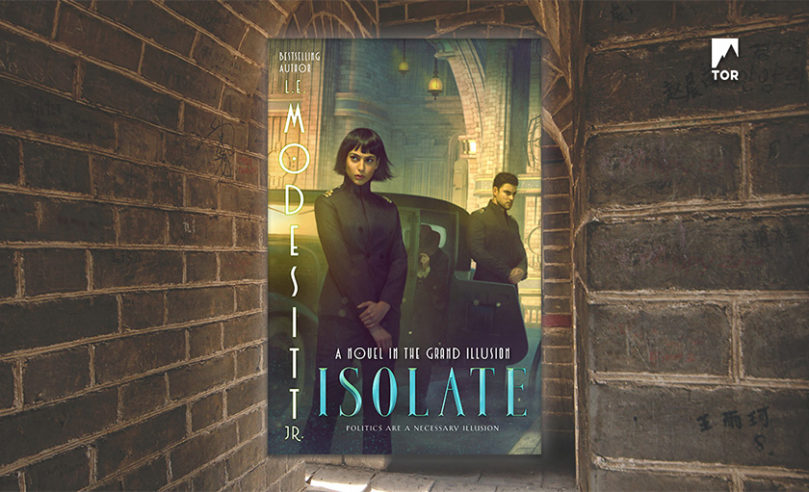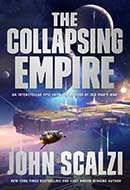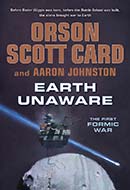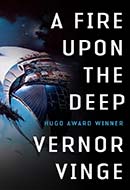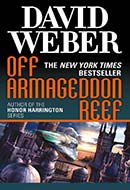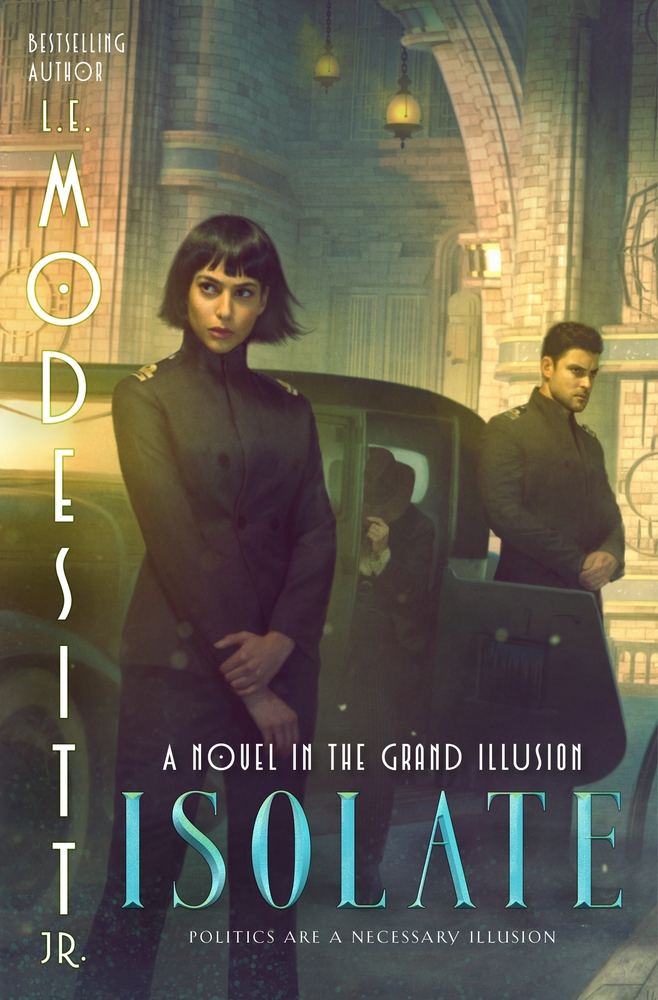 From L. E. Modesitt, Jr., the bestselling author of The Mongrel Mage, comes Isolate, a brand-new gaslamp political fantasy.
From L. E. Modesitt, Jr., the bestselling author of The Mongrel Mage, comes Isolate, a brand-new gaslamp political fantasy.
Industrialization. Social unrest. Underground movements. Government corruption and surveillance.
Something is about to give.
Steffan Dekkard is an isolate, one of the small percentage of people who are immune to the projections of empaths. As an isolate, he has been trained as a security specialist and he and his security partner Avraal Ysella, a highly trained empath are employed by Axel Obreduur, a senior Craft Minister and the de facto political strategist of his party.
When a respected Landor Councilor dies of “heart failure” at a social event, because of his political friendship with Obreduur, Dekkard and Ysella find that not only is their employer a target, but so are they, in a covert and deadly struggle for control of the government and economy.
Steffan is about to understand that everything he believed is an illusion.
Please enjoy this free excerpt of Isolate by L. E. Modesitt, Jr., on sale 10/19/2021.
1
The giant corporacion Eastern Ironway apparently used its contacts and influence to illegally gain underpriced coal leases in the protected Eshbruk Naval Coal Reserve, according to a letter sent to the Imperador and Premier Johan Grieg. The leases were granted to Eastern Ironway by the Minister of Public Resources, Jhared Kraffeist, late last year, despite the fact that corporacions are forbidden by law to obtain coal or any other resource from such reserves . . .
. . . Eastern paid the absurdly low price of 200,000 marks, as well as a “commission” amounting to 10 percent of that sum. According to the letter, an investigation by the Justiciary Ministry found that all records of who had received the commission have vanished . . .
Obtaining those leases, also according to the letter, allowed Eastern to quickly begin mining operations and to obtain fuel for its locomotives at a far lower cost than coal obtained elsewhere . . .
Minister Kraffeist refused to comment on the allegations . . .
The signature and title on the copies of the letter distributed anonymously on Eastern Ironway stationery to newssheets all across Guldor and to all councilors were removed, but it appears to have been written by an official of Eastern Ironway privy to all the details of the leasing procedure . . .
Given the seriousness of the charges, Minister Kraffeist was summoned to the Council Hall to meet with Premier Grieg . . .
At the request of the Imperador, the Premier has ordered the Council not to take up any legislative matters while the Palace and Premier review the matter . . .
Gestirn, 13 Springend 1266
2
Duadi
14 Springend 1266
Dekkard woke suddenly in the darkness of his small room above the garage, a garage housing the most recent of the modest dark green Gresynt steamers that were one of the hallmarks cultivated by the councilor. Keeping with Obreduur’s penchant for avoiding obvious ostentation, the garage was only large enough for a pair of automobiles, one the larger eight- seater used by the councilor, and a smaller six- seater driven by his wife the legalist to and from her office and elsewhere.
Dekkard quickly rose, shaved, and took a brief lukewarm shower, then dressed in his duty security grays— a gray military-style tunic and matching trousers, with a black belt for his truncheon and gladius . . . and the concealed brace of throwing knives. Out of habit, he wound his watch, then left his room and took the rear staircase that served the staff. Once on the main floor, he took the back corridor to the kitchen and the small staff room where he, Ysella, Rhosali the housemaid, and Hyelda the cook all ate… or could talk or gather in their infrequent free time.
The staff room held only Rhosali. That scarcely surprised Dekkard, since the family, except for Obreduur himself, was not known for rising earlier than required and since the same was true of Ysella, and sometimes even Rhosali, while Hyelda was already in the kitchen preparing breakfast, both for the four staff and for the family, those in residence at the moment, since the eldest son was in his second year at the Military Institute in Veerlyn.
Dekkard knew breakfast would be simple—café, orange juice, and heavy croissants, with a slice of quince paste, or, if Hyelda was feeling cross, tomato jelly. While waiting for Hyelda to set out the large tray from which the staff helped themselves, Dekkard poured himself a mug of café and took a sip. He was about to take a second sip when Hyelda appeared in the kitchen doorway.
“The Ritten wishes a word with you.” The cook gestured.
Dekkard immediately stood, nodding to Rhosali, before leaving the staff room. From there, he walked through the dish pantry, opened the service door to the breakfast room, closing it behind him, before coming to a halt several paces from the table, where the mistress of the house presided over her end of the table. She had been a legalist long before marrying Obreduur, but he seldom mentioned her present or previous practice, and Dekkard felt he wasn’t in a position to ask about specifics unless others voiced them. Just as he hadn’t been about to ask why she had spent two weeks in Gaarlak, when she had no family there. But then, she had traveled to various cities in Guldor during the two years Dekkard had worked for Obreduur. Dekkard had gathered that she still did legalist work for various guilds and other clients, and that might be why the Obreduurs could live in East Quarter, given that councilors weren’t paid comparatively that much.
Ritter Obreduur sat at the other end, sipping café as he read through the morning newssheet. The title, which had originally been given only to landed nobility, now also applied to councilors and their spouses, not only while they served, but thereafter, although it was not hereditary. Except for Obreduur’s white linen jacket, and whatever scarf Ritten Obreduur would wear over her outerwear, the two were dressed for the day.
“You’re always so formal, Dekkard, I’m sure you already know what I need.”
“Lighting off your steamer, Ritten Obreduur?”
“Exactly. You can finish your breakfast first.”
“I’ll take care of it.” Dekkard inclined his head. “Is that all?”
“That’s all.”
“I’ll need to leave a sixth earlier, Steffan,” said the councilor without looking away from the paper, a paper held in his left hand, the one with the bent and twisted little finger and the one adjoining, a legacy from his much younger days as a stevedore.
“Yes, sir.” Ten minutes earlier wouldn’t be too bad.
The councilor did not reply, nor look in Dekkard’s direction, not that Dekkard would have expected it, and the isolate slipped out of the breakfast room and headed back to the staff room. His lighting off Ritten Obreduur’s steamer would save her only a few minutes, but if that was what she wanted, he was happy to take care of it.
Ysella had arrived in the staff room in Dekkard’s absence, crisp as always in her duty grays, identical to his, except that she carried only a personal-length truncheon, and she looked up from her plate as Dekkard returned. “What did she want? For you to light off her steamer?”
“Of course.” Dekkard seated himself and immediately added more café to his mug and took a swallow. He noted that Hyelda had provided slightly larger slices of quince paste than usual. He appreciated that, because, as the son of Argenti parents who had fled the cold and the altitude of the Silver Heights—and the comparative lack of opportunity for artisans—he’d been raised on more substantial breakfast fare. After a little more café, he drank the small glass of orange juice in one long swallow, then split the croissant and slipped the quince paste in the middle, and began to eat it like a sandwich.
Ysella shuddered. “I still don’t see how you can eat so much sweet in the morning.”
Dekkard swallowed the mouthful he’d been chewing, then replied, “I’ve told you. Quince is bittersweet, not honey-sweet.”
The empie just shook her head, as did Rhosali, who took a last swallow of café, then rose and hurried off to begin her day.
“We’re leaving a sixth earlier this morning,” Dekkard said. “The councilor didn’t say why.” He almost winced when he realized how unnecessary the second sentence had been.
“You always say something about his never explaining,” replied Ysella. “By now, you should know I understand that.”
“I know you understand. It’s just that it feels rude to me not to say something.” And I know you can’t sense what I feel. Dekkard wondered, far from the first time, whether other isolates felt the need to explain to empath partners, given that empaths couldn’t sense any emotion from isolates, while they could from normal people, and even from other empaths who weren’t careful about blocking their feelings.
Ysella smiled. “Steffan . . . I know . . . but I do understand.”
“Thank you.”
After quickly finishing his breakfast, Dekkard rose and walked to the garage, where he opened the garage doors, then topped off the water and kerosene in both steamers before lighting off their boilers. Even with the request from Ritten Obreduur, Dekkard had the councilor’s steamer under the front portico ready to go at a half before second bell, a sixth earlier than Obreduur had requested. He’d even had time to clean the few mud splatters from the glass of the front windscreen and the side windows. He rolled down the front windows on each side of the steamer a precise three digits, just enough that there would be a slight breeze in the rear on the drive to the Council Office Building.
Then he took another look at the pale green sky over the city, a sky with just a hint of haze, although that would likely thicken over the course of the day, but at least there was no sign of rain.
Ysella accompanied Obreduur down the granite steps from the small mansion that most of the Sixty-Six would have considered modest, but then circled around to the other side, because her job was to sit up front where she could sense trouble more effectively. As a security aide, while on duty she was unofficially exempted from the customary headscarf worn by either the few professional women or the wives or daughters of the upper classes, either commercial or landed.
Dekkard waited for the councilor to seat himself, then released the brakes and pressed the throttle pedal, and the Gresynt accelerated smoothly and quietly as Dekkard guided it out from under the portico and along the concrete drive leading to the gates. Once on Altarama Drive, heading west, Dekkard checked the rearview mirrors to see whether anyone was following the steamer, then looked farther ahead, but he saw only a smaller Realto steamer turning in to the drive of a mansion easily thrice the size of the councilor’s dwelling. That mansion belonged to the chairman of Transoceanic Shipping, or so Ysella had told Dekkard.
Dekkard and Ysella had been especially wary ever since the attack nearly a month earlier, although there had been no other attempts and no obvious signs that Obreduur was being watched or shadowed, but all that meant was that no one had gotten close enough for Ysella to sense the range of feelings possessed by an attacker—or the total lack of emotional radiation from an isolate.
As he continued driving, Dekkard wondered who the councilor might be meeting or receiving, or what else he might be doing, because the Council was only in pro forma session pending the Imperador’s decision on whether to remove Premier Grieg or to dissolve the Council . . . or possibly, to do neither in the wake of the Kraffeist Affair and the underlying peculation, the extent of which remained to be discovered. As if it ever will be.
Some four blocks later, he turned off Altarama and onto Imperial Boulevard, easing the Gresynt in behind a limousine with a poorly adjusted burner, although most wouldn’t have noticed the thin gray wisps of smoke. At least the smoke wasn’t black and odoriferous, unlike what poured from the chimneys of the large manufactories around cities like Oersynt, Kathaar, or Uldwyrk.
Imperial Boulevard was the smooth, asphalt-paved main thoroughfare that ran north from the harbor to the Imperador’s Palace, and consisted of two sets of double lanes divided by a median featuring raised marble-walled gardens flanked by soft-needled Folknor pines. Marble sidewalks not only stretched between the center gardens and the trees, but also flanked the outer sides of the roadway. By decree, later ratified into law by the Council, all structures located within a block of the boulevard had to be built of stone and roofed either with tile or slate and could not exceed five stories, although few were more than three. Dekkard had to admit, even in his more cynical moods, that Imperial Boulevard was impressive, with all the hotels and business buildings, and the view of the Palace of the Imperador was especially striking.
“Steffan,” said the councilor, “we’re early enough that you don’t have to drop us off. Just park the steamer, and we’ll walk.”
“Yes, sir.”
After driving a mille and a half, he turned off the boulevard onto Council Avenue, the last major cross street before the Way of Gold, which not only split around the circular Square of Heroes, but ran along the south edge of the Palace grounds. On the north side of the square was the formal entrance to the Palace. Dekkard drove another half mille, before slowing the steamer as they approached the guard post at the entrance to the covered parking area for councilors.
After visually inspecting the steamer, the emblem welded to the front bumper, and those inside, the guard, dressed in the standard pale green uniform, waved the Gresynt through the open gate. After parking the steamer, Dekkard shut off the burner, and he and Ysella escorted Obreduur from the garage across the drive to the Council Office Building and up to the office.
All councilors’ offices were identical, consisting of three connected chambers: the councilor’s private inner office, with a small attached bathroom containing little more than a sink, toilet, and closet; the anteroom, holding a receptionist and her desk, with chairs and a leather-upholstered backed bench for those very few waiting to see the councilor and two table desks at one end for junior assistants, usually for staffers who also provided security in some form or another; and a moderately large staff office for the councilor’s senior legal or political staffers and several clerks with typewriters and their mechanical brass calculators.
Obreduur smiled warmly to the receptionist who also served as his personal secretary just before he walked past her desk and toward his office. “Good morning, Karola.”
“Good morning, Councilor.”
By the time her words were out, Obreduur was closing the inner office door.
“You’re early,” said Karola.
“He wanted to be early,” replied Dekkard. “The boulevard wasn’t crowded.”
“I was afraid you’d be here first. They had trouble with the omnibus, something about a leak in the flash boiler. Anna and Margrit kept telling me we’d make it, but I wasn’t sure.”
“What about Ivann and the others?” asked Dekkard.
“All the Crafter legalists are meeting with the Craft Party’s head legalist. Ivann said he didn’t know what it’s all about. Both Ivann and Svard went. Felix is in the office. I put the latest petitions and letters on your desk.”
Dekkard nodded. “Thank you.” As he walked over to his desk, and the stack of petitions, and a handful of letters, awaiting him, he pondered the reason for the meeting of all the Crafter legalists. Had the Premier asked the Justiciary Ministry to indict someone else associated with Minister Kraffeist . . . or had Grieg asked for one or all of the indictments to be withdrawn? But if it involved Kraffeist as Minister of Public Resources, why weren’t the commercial aides like Felix invited?
Shaking his head at what he didn’t know, Dekkard sat down at his table desk and looked at the stack of paper, all presumably from the Oersynt-Malek district from which Obreduur had been elected.
Dekkard’s other duties, when he was not protecting Obreduur, consisted mainly of reading petitions or correspondence dealing largely with artisan and specific craft-related matters and replying graciously to those who had simple inquiries, flagging and filing those that were insulting or threatening, while drafting a polite response saying nothing, and referring those requiring detailed expertise to Ivann Macri for his determination as to which of the three senior staffers should handle each. Ysella had similar duties for all other petitions or correspondence.
Both, but particularly Ysella, also covertly screened any visitors to the councilor.
Less than a third of a bell passed before the door began to open and Ysella said quietly to Dekkard, “An empie and isolate are coming with another person.”
That person had to be a councilor. Dekkard immediately stood, the fingers of his left hand brushing the hilt of his gladius. He didn’t recognize the councilor. “Welcome, sir.”
“Councilor Saarh to see Councilor Obreduur,” offered the security isolate, whom Dekkard vaguely recalled seeing before.
The auburn-haired councilor, who didn’t appear to be more than a handful of years older than Dekkard, stepped into the office, ignoring Dekkard and looking directly at Karola.
Having already stood, she said, “He’s expecting you, sir.” She rapped gently on the door to the inner office. “Councilor Saarh, sir.” Then she opened that door.
Saarh looked to the thin young man to his right, who nodded, indicating that he was the empie, although Dekkard would have guessed that, since the other aide in gray was more muscular and wore a sheathed gladius with a scabbard that looked considerably more worn than did Dekkard’s, while the empie only wore a personal truncheon similar to the one Ysella wore.
At that moment, the inner door opened, and Obreduur stood there, smiling pleasantly. “I’m glad we have this chance to get together.” He stepped back, leaving the door open.
Saarh returned the smile. “So am I.”
In moments, the two councilors were alone in the inner office, the door closed.
Ysella looked to the other empie. “It’s good to see you again, Micah. I didn’t think you could stay away from the Council.”
Micah offered a sardonic smile. “It’s not as though I had much choice. Most commercial firms are leery of empies who’ve worked for councilors. We’re not as mobile as chills are.”
Especially male empaths. Dekkard knew that, but he’d never understood the reason.
Ysella half turned. “Steffan, this is Micah Eljaan.”
Eljann’s eyes flicked to Dekkard.
“Steffan Dekkard.” Dekkard knew that the other isolate had to be at least ten years older and that he’d seen him with Councilor Freust, but he had no idea what his name was, since security staff were seldom introduced, except by other security types when councilors weren’t present, and that didn’t occur often, something Dekkard wouldn’t have guessed before he joined Obreduur’s staff.
“Have you met Malcolm? Malcolm Maarkham?” Micah nodded to the older isolate.
“We’ve crossed paths, but that’s all.”
“Barely that,” affirmed Maarkham blandly. “You’re from Oersynt, aren’t you, before the Military Institute and security training?”
Dekkard nodded. “And you? You were with Councilor Freust for some time.” That was an estimation barely more than a guess.
“Nine years. I grew up in Uldwyrk. Security training through the district patroller academy.”
When no one else spoke immediately, Eljaan turned to Dekkard. “Might I ask how you came to work for Councilor Dekkard?”
“He was looking for a security aide. I was recommended by both the Institute and the Artisans Guild of Oersynt. He interviewed me and eventually hired me.” What Dekkard wasn’t about to mention was that Obreduur had personally observed how Dekkard had handled all the security tests and physical challenges required, known as the “chill killers.”
“Artisans in your family, then?” asked Maarkham.
“Both my parents.”
“That makes sense for a Craft councilor,” said Eljaan cheerfully.
Dekkard caught the hint of a wince on Ysella’s face, but doubted anyone else did.
“Don’t let us keep you from what you have to do,” said Maarkham firmly, looking at Eljaan.
“No, please don’t,” added Eljaan, his voice still cheerful.
“Thank you,” replied Ysella quickly. “We do have petitions to go through.”
“I’m glad I don’t,” replied Maarkham dryly, seating himself on the bench in the front of the chamber.
Eljaan sat beside him.
Dekkard reseated himself, picked up the top petition in the stack, and began to read about how the town of Elsevier had hired non-guild stonemasons to rebuild the town hall in violation of the national law that required all large construction projects to use guild workers. Macri or Roostof have to handle this. Dekkard suspected he knew the answer, which was that rebuilding work below a certain monetary value was exempt from that law, but Macri would definitely prefer that Dekkard not attempt a legal explanation.
Less than a sixth of a bell passed before the door to the councilor’s private office opened, and Councilor Saarh emerged, smiling pleasantly, followed by Obreduur, who halted in the doorway as Saarh walked toward the outer door, where Maarkham and Eljaan stood waiting.
Eljaan opened the door. Maarkham stepped out first, followed by Saarh. The moment the outer door closed behind Eljaan, Obreduur stepped back into his inner office, closing the door.
Ysella looked to Karola. “What can you tell us about Councilor Saarh?”
“Councilor Obreduur told me that he was chosen last week as Councilor Freust’s replacement by the Landor Party leadership. He’s from Khuld.” Karola lowered her voice. “He’s married to Councilor Freust’s youngest daughter. That’s all I know.”
“Did the councilor mention anything about Freust’s death?”
“No, he didn’t.”
Ysella nodded. “Thank you.”
Several moments later, after Obreduur summoned Karola, Dekkard looked to Ysella. “What am I missing about Freust?”
“I don’t think Freust’s death was . . . natural.”
“Because of the timing of his death . . . or because of the emp attack on the councilor right after that?”
“Both.”
“Do you know if Freust was trying to build a coalition against the Commercers? Based on the agricultural-tariff reform bill?”
“Coalitions based on a single issue don’t work in the Council. Not for long, anyway. Obreduur might have been exploring a longer-term alliance with the Landors, but Freust was likely the only one who could have brokered it to his party, and one of the few Landors Craft councilors would trust.” She shrugged. “Now we’ll never know.”
Then, as Karola stepped out of Obreduur’s office, Ysella picked up a petition and began to read.
While any party could replace a councilor who died with another party member, Dekkard wondered what had determined the Landor Party to pick Saarh. Because the seat would fall to the Crafters or Commercers in the next election? Because Saarh couldn’t afford to buck the Landor leadership? To pay some political debt? Or something else entirely? But then, Guldoran law didn’t require a councilor to be from a district prior to an election, only that he maintain “a presence” in the district thereafter, although the majority of candidates running for a councilor’s seat usually were long-term residents of the district or were from some place very close.
Shaking his head, Dekkard went back to reading and sorting petitions.
Macri and Roostof returned to the office a sixth after the third morning bell.
“How was the meeting?” asked Ysella cheerfully.
“Intriguing, but boring after the first sixth.” The thin-faced and angular Macri grinned.
“Are the other parties having meetings for their legalists?” asked Dekkard.
Roostof shrugged.
“By now, Steffan,” replied Macri cheerfully, “you should know that the Landor councilors don’t trust legalists, especially their own, and the Commerce councilors provide extra rewards to their legalists not to talk to anyone.”
Dekkard didn’t try to point out that staff salaries were limited in various legal ways, because he’d already discovered that councilors had their ways of compensating staff that didn’t violate the letter of the law, particularly Commerce councilors, although Landor councilors were also known for such. Most Craft councilors had more limited resources, although all councilors received stipends for housing security aides.
Dekkard spent another bell sorting through the petitions and letters, then carried a small stack to Macri and a smaller pile to Raynaad, before sitting down to handwrite drafts to more mundane petitions and letters, drafts that Margrit would type up and then Macri would review before submitting them for the councilor’s signature . . . except for those on which Obreduur made corrections, but there were usually few of those. Obreduur often just added a few lines in his own hand.
Just before noon, Obreduur appeared in the front office, and both security types stood.
After escorting him to the councilors’ private dining room, Dekkard and Ysella quickly ate in the staff cafeteria before escorting Obreduur back to the office.
No sooner had they returned to drafting responses than the door to the larger staff office opened and Felix Raynaad stepped out. The stocky brownhaired older economic and commercial aide looked toward the receptionist and personal secretary. “Karola, please let me know when the director of personnel from Guldoran Ironway arrives. The councilor wants me to be with him in the meeting.”
“Yes, sir. I will.”
Dekkard looked at the other man. “Still the yellow cedar issue, Felix?”
“What else?” Raynaad shook his head before retreating.
While Dekkard knew few of the specifics, the general problem was that the Woodcrafters Guild had filed a legal objection to Guldoran Ironway’s use of yellow cedar as paneling for ironway coach cars when the ironway had shifted from black walnut earlier in the year. The guild opposed the use of yellow cedar, claiming that working with it caused consumption and breathing problems, and sometimes even incontinence, and suggested either returning to black walnut or using red cedar.
Guldoran contended that the yellow cedar was lighter, straight-grained, and stronger than the red cedar, which was not only heavier, but less regular in grain and coloration, and slightly more prone to splitting and that the red cedar was more expensive because it had to be transported by ironway some fifteen hundred milles from Jaykarh to Oersynt.
When the chimes at the top of the Council Hall tower rang out three bells, bells that had once been more necessary before the development of inexpensive spring-wound timepieces and small clocks, Dekkard looked to the main office door, but no one appeared. A sixth of a bell passed, then a third, before Raynaad peered into the front office and looked at Karola.
“No, sir, the director hasn’t arrived.”
At that moment, Obreduur opened his door. “He’s still not here?”
“No, sir,” repeated Karola.
The councilor frowned. Then he reentered his office and closed the door.
Dekkard had wondered, more than once, what Obreduur did in the office when he wasn’t meeting people . . . besides reading his copy of Rules and Procedures or writing personal missives that he handed to Karola—and no one else—for dispatch by messenger or post. But Obreduur wrote far more than a few such missives, and they couldn’t be to a mistress, not when just about the only times he was away from Dekkard and Ysella were when he was in the councilors’ lobby or dining room, the main Council Hall chamber, or at home on Findi, when they had the day off.
A good sixth later, a messenger in the gold and black uniform of Guldoran Heliograph, whose solar-mirror towers conveyed messages and linked the larger cities, entered the office and handed an envelope to Karola. “For the councilor.”
Karola waited only until the messenger left before standing and rapping on the door. “There’s a heliogram for you, sir.” Then she entered, returning to her desk almost immediately.
Within a few minutes, Obreduur walked out of his office, his jacket partly unbuttoned, and hurried into the larger staff chamber, leaving that door open, which Dekkard appreciated, because with both the door to Obreduur’s private office open and the staff office door open, there was more of a breeze, although the offices weren’t nearly so hot as they would be in another four weeks at the beginning of summer.
Then Obreduur walked back toward his office, leaving the staff door ajar. Abruptly, he stopped, turned, and addressed Dekkard. “Director Deron was unable to make the meeting because of an ironway problem. He’ll be here tomorrow afternoon. I’d like you to join Felix at the meeting.”
“Yes, sir.”
“That ironway problem overloaded the heliograph system . . . everyone must have been sending messages because they couldn’t get somewhere or another.” Obreduur shook his head. The councilor didn’t quite slam the door as he reentered his office.
“Going to meetings, now,” said Ysella. “You’re coming up in the world.”
“I hope I do as well as you do,” returned Dekkard.
“He asks for me when he wants the opinion of a working woman . . . or an empath.”
Dekkard couldn’t help but wonder what had been in the heliogram that had prompted Obreduur to have Dekkard join the meeting. He did know one thing—that Obreduur was far from happy. A meeting between Obreduur and an ironway director was not likely to be pleasant for Dekkard, especially if Obreduur was as unhappy as he seemed. Dekkard looked to Ysella and mouthed, “Is he as angry as I think he is?”
“More like irritated.”
Even so, that meant that the drive back to Obreduur’s small mansion would be very quiet.
Dekkard decided to return to drafting responses.
3
On Tridi morning, Dekkard hurried down to the staff room because he wanted to look at Hyelda’s Gestirn. He hoped that there might be more about the Kraffeist Affair, especially after the newssheet stories on Unadi, but there had been nothing on Duadi. Unfortunately, there was still nothing in Gestirn, and Dekkard doubted that there would have been more in the other newssheet— The Machtarn Tribune— given its pro- Commercer bias.
Dekkard did see a story head that caught his eye— imperial university to cut admissions. Frowning, he skimmed the article, which quoted the Minister of Health as saying that providing university educations to more students than there were positions requiring such an education was a waste, and that enrollment at all government- funded universities would be capped at present levels for the foreseeable future.
While Dekkard wondered about that, and even more about why there was nothing more in the newssheets about the whole Kraffeist Affair, there was little he could do about it.
With that thought, he concentrated on his breakfast.
Obreduur was pleasant but quiet on the drive to the Council Office Building, as he usually was, but he’d been so reserved the night before, reflected Dekkard, that anyone observing from a distance, except an empie, might have thought him an off-duty isolate, although most educated isolates were in some form of midlevel security, and certainly not elected officials.
Once in the office, Dekkard began his work sorting petitions and letters, as did Ysella.
At a sixth before the third bell of the afternoon, Director Deron arrived unaccompanied, except for the usual Council Guard. He was attired in the older and more conservative style— a silvery, dark gray, formal military- style tunic with the upright collar, the kind of tunic that did not require either a formal shirt or a cravat, above black trousers and dress black boots. His smooth black hair was the only concession to modernity, cut far longer than the cropped look required of both naval and ground forces, but to Dekkard that concession seemed out of place, almost grudging, especially given Deron’s military brush mustache.
“Director Deron,” said Karola brightly, “let me tell the councilor that you’re here.” She looked to Dekkard. “Would you mind telling Sr. Raynaad that the director is here?”
Dekkard nodded, then stood and walked across the office and into the staff office. “Felix, the director is here.”
In the moments it had taken Dekkard to notify Raynaad and for the two of them to return, Obreduur had opened his offi ce door. “Welcome, Director Deron. After hearing about the ironway . . . mishap, I’m glad to see you’re safely here.”
“The ironway is quite safe, and I am here.” Deron glanced at Dekkard, not quite askance, taking in the semi-military security grays, before returning his full attention to Obreduur.
“Sr. Dekkard has some knowledge and experience that may be useful,” said Obreduur warmly, stepping back several paces and gesturing to the chairs facing his desk.
Dekkard followed Raynaad’s lead and moved toward the pair of chairs set somewhat farther from the desk, but closer to the slightly open window so that the two aides would have their backs to the light. They did not seat themselves until the councilor and director began to sit down.
Obreduur smiled pleasantly, but did not speak for well over a minute. “I believe you requested this meeting.”
“I did, Councilor, in hopes you might aid in resolving the situation I earlier wrote about.”
“You’re referring to the difficulties you face with the Woodcrafters Guild over the use of yellow cedar?”
“Precisely.”
“How exactly do you think I might help . . . resolve these difficulties?” Obreduur’s voice remained warm and interested, with a slight suggestion of puzzlement.
“There are certain . . . economic realities. Guldoran has to work within those realities. One of those realities is that our passengers expect a high level of quality in our facilities and carriages. Maintaining that quality is expensive, and passengers will only pay so much to travel the ironway. The yellow cedar is of better quality than the red and costs considerably less. The grain pattern of the red is also . . . seen as more common. To use a lower-quality wood at a higher price . . .” Deron shook his head dolefully.
“Your concerns are most understandable.” Obreduur nodded to Raynaad. “Felix, perhaps you could address the matter in more detail.”
Raynaad nodded and turned his head toward Deron. “Honored Director, I also understand that passengers can be most particular. Guldoran Ironway has the reputation for maintaining high standards, but people seem to be willing to pay for those standards. The prices of tickets in all classes have risen five percent every year for the past four years. The results of certain inquiries suggest that passenger traffic has increased enough that two extra cars have been added on most trains from Machtarn to Oersynt. Under these circumstances, can you tell the councilor exactly how the use of red cedar will impact the profit margin of passenger service, not just in general, but specifically?”
Deron’s pleasant expression faded slightly. “Sr. Raynaad, you must understand that I am not empowered to reveal the specifics of the finances of Guldoran Ironway, but I would not be here if the matter were inconsequential.”
“I’m not a woodcrafter,” said Obreduur warmly and smoothly, “but if it’s a matter of décor and style, wouldn’t some other wood be equally suitable, perhaps black cherry? I understand that the presidente of Guldoran Ironway has an exquisite dining room, entirely of black cherry.”
“Presidente Oliviero does have impeccable taste, but I fear black cherry is much more expensive than yellow cedar, if not quite so expensive as black walnut.”
“Steffan,” said Obreduur, “how do you think the Woodcrafters Guild feels about the matter?”
Dekkard had thought about how the guild members might have felt, but had not thought Obreduur would have asked his opinion. After a slight pause, he replied, “No one in the guild has contacted me, sir, but coming as I do from a family of artisans, I would judge that the woodworkers do not wish to hazard their health and shorten their lives by working with the yellow cedar. Presidente Oliviero isn’t required to make such a sacrifice. Why should they?”
“That’s a fair question, don’t you think, Director?” asked Obreduur mildly.
“No one is forcing them to work with the yellow cedar. If they do not wish to work with it, then they can go work elsewhere.” Deron shrugged. “If none of the guilders wish to work with the cedar, then we just might move carriage building to Kathaar. It’s closer to the ironworks and to the yellow cedar.”
“There’s no Woodcrafters Guild there,” said Obreduur. “That would change with a need for woodworkers, and Guldoran would have spent hundreds of thousands of marks, if not more, to move the coach-building facility. Then, too, the ironway would still need a guild agreement.”
“You also build the military coaches in Oersynt,” added Raynaad. “First Marshal Bernotte might not be exactly pleased with an inexperienced workforce and the delays. Quality would suffer.”
“It might just be better to return to using black walnut for the paneling,” suggested Obreduur.
“That’s not possible,” said Deron. “The blight has taken too great a toll on the black walnut trees, and the timber from the infected or dead trees has ghastly yellow streaks in it.”
“You seem to have quite a problem there,” mused the councilor, his tone sympathetic. “The red cedar isn’t of high enough quality and costs more. The yellow cedar costs less and is of higher quality, but working with it poisons the woodworkers. I wonder how many woodworkers would wish to continue for long under those circumstances.”
“Your sympathy, honored Councilor, is appreciated, but it doesn’t resolve the difficulty.” Deron’s tone was even and polite, if little more.
“Well . . . the ironway could take the high road, so to speak,” said Obreduur. “You could just tell everyone that in order to maintain the historic quality of amenities and service and also to safeguard the health of the workers, the newest carriages being built by the ironway will feature cherrywood paneling, and that may entail a slight fare increase.”
“Cherrywood? I don’t believe that was considered.”
“It’s of high quality, if not as high as black walnut, and considerably less expensive than the black walnut previously used.” Obreduur smiled warmly. “I believe that there is a large stand of mature cherry trees not all that far from Oersynt, certainly sufficient for the ironway’s use for more years than will affect either of us or our children.”
“Are you—”
“Almighty, no!” replied Obreduur. “That would be verging on conflict of interest and worse. I’m not related to the owner in any way whatsoever, but I do know that the lands might be available. I could put you in touch if Guldoran Ironway is interested. It just struck me that it might offer a solution in everyone’s interest.”
Deron cocked his head, frowning, before nodding. “It would be definitely worth exploring. It’s not the solution that the presidente was hoping you might facilitate . . . but . . .”
“I think you’ll find this solution might be far better for everyone,” said Obreduur. “Far better, especially if you consider how much good will the ironway could reap from such a decision. I look forward to hearing what your presidente decides.” He rose from his desk.
Dekkard and Raynaad immediately stood as well.
Deron rose also, the momentary enigmatic smile quickly vanishing from his face. “I appreciate your willingness to hear me out and your thoughtfulness in presenting a possible alternative. One way or another, I will be in touch with you.” He inclined his head.
Dekkard could sense that an unspoken agreement had been reached. Also realizing that his next task was more than obvious, he moved to the door, opening it for Deron.
Director Deron turned, glancing at Felix, but not Dekkard, before he left the inner office, then the outer office, moving quickly but not hurriedly.
“I’ll need a few words with both of you,” said Obreduur. “Please close the door.”
Dekkard did so, then turned to see what the councilor had to say, wondering whether those words would be favorable or less so. He was relieved to see Obreduur smiling.
“You both did well.” He paused, then turned his eyes on Raynaad. “Give the background file on the Woodcrafters Guild to Steffan so that he can read through it.” He shifted his glance back to Dekkard. “As Felix knows, nothing you hear in this office is to be discussed with anyone but those present.” He held up a hand. “No. There’s nothing that’s either unethical or illegal. I know the Landor who has those lands and would settle for a fair price, but I don’t want anyone else to find out until matters are resolved. Is that clear?”
“Yes, sir.”
Obreduur smiled again. “I doubt that I had to caution you, but some things are best stated clearly. That’s all for now.”
Raynaad led the way out of the inner office, and Dekkard gently but firmly closed the door.
“How did the meeting go?” asked Ysella.
“How do all meetings go?” replied Raynaad gently, but sardonically. “You’ve been in enough of them.”
Dekkard kept his smile to himself, even as he appreciated Raynaad’s quickness in showing him the appropriate response. He added, “I still have a bit to learn.”
“Don’t we all,” replied Ysella.
As Dekkard settled back at his table desk, he couldn’t help but wonder why Obreduur had chosen the meeting with Guldoran Ironway to start including him in meetings. It couldn’t just be because of the Woodcrafters Guild, not when the councilor dealt with a range of guilds in his legislative work. And how does he know who has cherry orchards to sell? Even as he thought about it, the answer was obvious, simply because Obreduur wasn’t that close to that many Landors.
Was it because Obreduur had seen enough of what Dekkard had done to include him in more? Or could it just be that Raynaad had too much work?
Dekkard shrugged. He’d find out soon enough.
Copyright © L. E. Modesitt, Jr. 2021
Pre-order Isolate Here:

